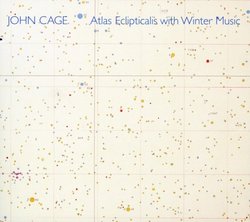| All Artists: John [1] Cage, John Cage, Melvin Strauss, Callithumpian Consort of the New England Conservatory, Hartt Contemporary Players, New Performance Group, Wesleyan Symphony Orchestra Title: John Cage: Atlas Eclipticalis with Winter Music Members Wishing: 3 Total Copies: 0 Label: Mode Original Release Date: 1/1/2007 Re-Release Date: 2/27/2007 Album Type: Original recording remastered Genres: Special Interest, Classical Styles: Chamber Music, Historical Periods, Classical (c.1770-1830), Modern, 20th, & 21st Century, Instruments, Keyboard Number of Discs: 3 SwapaCD Credits: 3 UPC: 764593000624 |
Search - John [1] Cage, John Cage, Melvin Strauss :: John Cage: Atlas Eclipticalis with Winter Music
 | John [1] Cage, John Cage, Melvin Strauss John Cage: Atlas Eclipticalis with Winter Music Genres: Special Interest, Classical
|
Larger Image |
CD Details |
CD ReviewsCan we now say "vintage Cage"? scarecrow | Chicago, Illinois United States | 03/28/2007 (5 out of 5 stars) "'Atlas Eclipticalis' (AE) was Cage's first primary work for orchestra with a technique now for searching for the mysteries in indeterminacy. He had now about ten years experience with Zen, and Chance procedures, and after the 'Concert for Piano', this is strictly mining the deeps of instrumental timbre. The performances imply, 'cry out' almost much of the time for the live dimension.Cage was the first to have invented the genre "performance art", art with his "music-walk", "watermusic", and the myriad number of "variations".(a dedication to Schoenberg).
Here the playing is elegant,straight,very modern,very egalitarian, everyone mindful of place and where they are,timbral layerings of events,like muted strings, brass with plucked events; although nothing is coordinated, the musicians merely work their way through their own parts quite independently of an all-encompassing plan. In fact a 'Plan' would be quite counter-productive to what is needed here, a sensitivity to timbre and sound,of place and space;all the modernist canons; how it comes into being, consciousness, what it does, if anything, how it is not representing anything,how it occupies space,but more with purposeless purpose. But you can tell the players here have lived with this music. The various readings are also good, although for me hearing the work once is enough. That's the trouble with Cage today, as you listen you say to yourself "OK, I got it !" sound represented for itself, to itself, for nothing else, although Cage you can detect the patrilinear expositions of his "dialogue" with the Europeans,not only Duchamp but he always stayed one step concpetually ahead, whatever he did they(mostly Stockhausen) followed, with graphic notation, then aleatoric (chance),(process pieces)then performance art,,then live electronics, then theatre-happenings, (Fluxus)then purly instrumental terrains, as "Etudes", and various 'concerti-like'processes pieces. The "Winter Music" here as well suffers from not experiencing it in an antiphonal outdoor situation. I recall a performance in France, where the audience sat in a courtyard(typically European aritocracy architecture),this was an inherited music school, where there was a piano virtually in every room, North, South, East and West,Upper and Lower; incredible,the result was different gradations of timbre, some very weak coming from the furthest place where you were,again Cage's music implies much more than the surface, he tries to utilize the complexity which is reality and superimposes an idea for a piece of music; here you get the concert version,more Wall-like" but equally with lots of silences, and things item timbral particles to contemplate; that has its own merits. The cover here alone is worth a nice price, Cage's graphics are without question his best work, and a pointedness to the next thread whatever it may become." |

 Track Listings (1) - Disc #1
Track Listings (1) - Disc #1